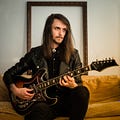Interview with Desert Island Big Band
What got you into music, and if you had not gotten into music what would you be doing today?
I remember watching a classmate of mine rip a guitar solo in the school gym when I was in fourth grade or so, and I wanted so badly to be up there doing… whatever THAT was. A couple years later my parents asked if I wanted my uncle’s o…
Keep reading with a 7-day free trial
Subscribe to Volatile Weekly to keep reading this post and get 7 days of free access to the full post archives.




